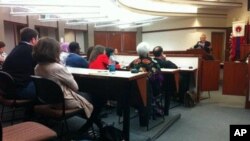The international prosecutor at the UN-backed Khmer Rouge tribunal says the court must work to ensure the practice of law if its legacy to Cambodia is to be assured.
“We have to show a good example to young lawyers,” Andrew Cayley told VOA Khmer in an interview.
Cayley spoke after a talk he gave to law students at Rutgers, in the US state of New Jersey, last month.
“We have to show them how to practice law in an honorable and decent way,” he said. “I think we can do that.”
Cayley has been pushing for the prosecution of two more cases at the tribunal, numbered 003 and 004, but those cases have stalled and are opposed by Prime Minister Hun Sen and other senior officials. That has fueled concern among court observers they are being stymied by government interference, a charge that officials deny.
“For me, the importance of these cases, more than anything, whatever happens at the end, is that the Cambodian people see a proper legal process taking place,” Cayley said. “Things that are dealt with properly, the people are doing their jobs and their duties under the law and the rules, that’s all.”
Peter Maguire, author of “Facing Death in Cambodia,” said the court has delivered a “mixture of law and politics.”
“That’s not to say it’s invalid, but it’s political justice,” he said. “It’s political by its very nature. The selection of defendants were political decisions.”
Sophal Ear, a professor at the Naval Postgraduate School in the US, said if the UN lets political interference go on at the tribunal, it will leave a bad experience for the national courts.
“If the Cambodian courts have any sort of lesson from that experience, it would probably be that even though you involve the international judicial process, you still can undermine them and go around their will and do whatever you want and get away with it,” he said in an interview.
Lars Olsen, a spokesman for Khmer Rouge tribunal, said it is too early to talk about the court's legacy now. However, he said, the court has already achieved much.
“We’re now starting what many people are saying is the main trial of three former Khmer Rouge leaders,” he said, referring to the case against Nuon Chea, Khieu Samphan and Ieng Sary, which is now under way. “This was almost unlikely a few years ago. Now, whether this is sufficient to leave a good legacy, we will know when the court has finished its job, and that’s not going to happen yet.”
Alexander Hinton, head of the Center for the Study of Genocide and Conflict Resolution at Rutgers, said the tribunal cannot change Cambodia’s judiciary over night.
“No one should expect the tribunal will suddenly transform Cambodia into a mirror of other countries that have fully established a rule of law,” he said. “But it’s something that makes people think, and Cambodians should decide by themselves how they’re going to move forward with it.”




